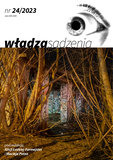Two narratives about Poland and society. Analysis of news programmes: Fakty TV and Wiadomości TVP
DOI:
https://doi.org/10.18778/2300-1690.24.04Keywords:
news, narrations, dichotomy, polarisation, public opinion, social divisionAbstract
The media landscape in Poland is increasingly polarised, with broadcasters promoting biased narratives that conveniently omit certain issues that do not align with their agenda. These narratives use rhetorical devices and symbolism to manipulate people’s perception of social reality and cultivate a shared worldview that legitimises their stance. This polarisation is linked to political parallelism, where media outlets align themselves with specific political factions and abandon their impartiality.
In Poland, identity media is prevalent, with broadcasters providing pre-packaged interpretations of news stories that further fuel the polarisation. It creates echo chambers, also known as epistemic bubbles.
The study examined news coverage from Wiadomości TVP and Fakty TVN, analysing the narratives presented and the values and topics covered. Broadcasters promoted different narratives, contributing to social divisions and strengthening dichotomy, with fixed topics dominating the coverage. The study underscores the media’s significant role in changing public opinion pressure, especially in controlling the authorities.
References
Badora, B. (2023). Źródła informacji o wydarzeniach w kraju i na świecie (68/2023). CBOS.
View in Google Scholar
Berger, P. L., & Luckmann, T. (2010). Społeczne tworzenie rzeczywistości. Traktat z socjologii wiedzy. Wydawnictwo Naukowe PWN.
View in Google Scholar
Brubaker, R., & Cooper, F. (2000). Beyond ‘Identity’. Theory and Society, 29(1), 1–47.
View in Google Scholar
DOI: https://doi.org/10.1023/A:1007068714468
Burszta, W. (2013). Kotwice pewności. Wojny kulturowe z popnacjonalizmem w tle. (I). Wydanictwo Iskry.
View in Google Scholar
Diaz Ruiz, C., & Nilsson, T. (2023). Disinformation and Echo Chambers: How Disinformation Circulates on Social Media Through Identity-Driven Controversies. Journal of Public Policy & Marketing, 42(1), 18–35. https://doi.org/10.1177/07439156221103852
View in Google Scholar
DOI: https://doi.org/10.1177/07439156221103852
Fisher, W. (1984). Narration as a human communication paradigm: The case of public moral argument. Communication Monographs, 1(51), 1–22. https://doi.org/10.1080/03637758409390180
View in Google Scholar
DOI: https://doi.org/10.1080/03637758409390180
Gill, A. M., & Whedbee, K. (2001). Retoryka. In Dyskurs jako struktura i proces (pp. 182–211). Wydawnictwo Naukowe PWN.
View in Google Scholar
Giza, A. (2013). Dwie Polski o dwóch Polskach, czyli samoreprodukujący się dyskurs. In Gabinet luster. O kształtowaniu samowiedzy Polaków w dyskursie publicznym. (pp. 105–145). Wydawnictwo Naukowe ‘Scholar’.
View in Google Scholar
Goodhart, D. (2017). The road to somewhere: The populist revolt and the future of politics. Hurst & Company.
View in Google Scholar
Haidt, J. (2014). Prawy umysł: Dlaczego dobrych ludzi dzieli religia i polityka? (A. Nowak-Młynikowska, Trans.). Smak Słowa.
View in Google Scholar
Hallin, D. C., & Mancini, P. (2004). Comparing media systems: Three models of media and politics. Cambridge University Press.
View in Google Scholar
DOI: https://doi.org/10.1017/CBO9780511790867
Jakubowska-Branicka, I. (2013). O dogmatycznych narracjach: Studium nienawiści. Wydawnictvo Trio.
View in Google Scholar
Klimkiewicz, B. (2021). The Public Sphere and the Changing News Media Environment in Poland: Towards Structural Polarisation. Javnost – The Public, 28(1), 53–74. https://doi.org/10.1080/13183222.2021.1861408
View in Google Scholar
DOI: https://doi.org/10.1080/13183222.2021.1861408
Klimkiewicz, B. (2022). Monitoring media pluralism in the digital era: Application of the Media Pluralism Monitor in the European Union, Albania, Montenegro, the Republic of North Macedonia, Serbia and Turkey in the year 2021. Country report : Poland. European University Institute.
View in Google Scholar
Kotras, M. (2023). Podzielone społeczeństwo w obrazie mediów III i IV RP (Wydanie I). Wydawnictwo Uniwersytetu Łódzkiego.
View in Google Scholar
DOI: https://doi.org/10.18778/8331-050-3
Matyja, R. (2018). Wyjście awaryjne. O zmianie wyobraźni politycznej. Karakter.
View in Google Scholar
Nguyen, C. T. (2020). ECHO CHAMBERS AND EPISTEMIC BUBBLES. Episteme, 17(2), 141–161. https://doi.org/10.1017/epi.2018.32
View in Google Scholar
DOI: https://doi.org/10.1017/epi.2018.32
Pariser, E. (2012). The filter bubble: How the new personalized web is changing what we read and how we think (2nd pr). Penguin Books.
View in Google Scholar
Reisigl, M. (2011). Analiza retoryki politycznej. In R. Wodak & M. Krzyżanowski (Eds.), & D. Przepiórkowska (Trans.), Jakościowa analiza dyskursu w naukach społecznych (pp. 151–186). Oficyna Wydawnicza Łośgraf.
View in Google Scholar
Roguska, B. (2023). Charakterystyka poglądów elektoratów. (97/2023). CBOS. https://www.cbos.pl/SPISKOM.POL/2023/K_097_23.PDF
View in Google Scholar
Wasilewski, J. (2012). Opowiesci o Polsce: Retoryka narracji. studio headmade.
View in Google Scholar
White, H. (2014). Przeszłość praktyczna. Universitas.
View in Google Scholar
Downloads
Published
How to Cite
Issue
Section
License

This work is licensed under a Creative Commons Attribution-NonCommercial-NoDerivatives 4.0 International License.





